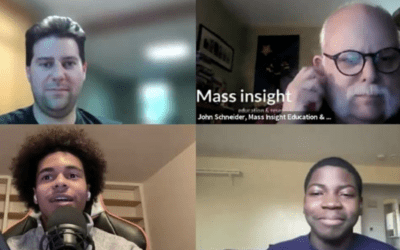What does the evidence say about how schools can improve the adolescent literacy crisis happening in our country? In this webinar, we explore the Institute of Education Sciences Reading Intervention Guide for Grades 4 through 9, found here, and diving into two of the...
The Next-Generation District and School Accountability System: A Call for Re-Focused Leadership
The Massachusetts Board of Education approved in June what may seem to some a small change to the state’s Next-Generation District and School Accountability System. The amended accountability language places “an increased focus on raising the performance of each school’s lowest performing students.” This represents a shift in how state results are reported and, more importantly, what those results mean for how district and school leaders should do their work.
How superintendents and principals assess both overall and individual student progress will determine the impact this new policy will have on narrowing the achievement gap in Massachusetts. Districts and schools will now be scrutinized on the progress of the bottom 25% of the students they serve. Though DESE will continue to be involved in the lowest-performing districts and schools, as they should, the new system reflects a level of reporting on the lowest achieving students in every district and every school regardless of overall school performance.
Many of the same practices used in district turnaround efforts now merit a serious look as we begin to shine the light on students who need to make the most gains. From my experience leading school turnaround in a Gateway City, this work starts by asking the right questions.
Here are five guiding questions which can help superintendents with their principals and those principals with their teachers, as they work collectively to lift the lowest 25% of their students:
- What do you want student(s) to be able to do and learn?
- How do you know student(s) are learning/getting it?
- What do you do when they are getting it?
- What do you do when they are not?
- What do you want the principal/teacher to do to improve the results of their students?
These questions serve as the focus for a superintendent’s visit to a school, becoming the foundation for a coaching plan for the principal, as well as a means to designate potential support from others. These same questions can be used by a principal to determine the needs of their teachers to help the principal differentiate the level of support each classroom will need to move students with the most challenges. The principal can then allocate time, effort, and resources accordingly to specific classrooms while monitoring the impact of these supports.
Focusing on the lowest 25% of student performance pushes us to go “under the hood” of comments often made during school visits when a principal is characterized as “great” or an educator is deemed as one who “really cares about kids.” Though affirming, these platitudes are not particularly helpful in defining what is needed to get to student results, particularly when there is a disconnect between what seemingly appears to be a “great” educator and mediocre or limited student progress.
We need to probe beyond the platitudes. By asking the right questions about student learning, we can provide more focused feedback and action steps helping those we lead get better at what they do. Taking the time to construct the right questions prior to a school or classroom visit allows us to make the most of our time during those visits, sending the right message of what we value as leaders. Asking the difficult questions of ourselves as leaders will set the stage for accelerating the learning of the students who need to make the most progress in every district – whether labeled turnaround, mediocre, low-performing, or high performing. With a sharpened lens on the students who are not achieving as well as their peers and with new ways of addressing those gaps in every district throughout the Commonwealth, we can then truly celebrate Massachusetts as leading the nation as the highest achieving state in the country.

Recent Posts
AP On-Track Framework Walkthrough — Webinar
Throughout the school year, AP students face crucial moments on their path to the AP exam. Mass Insight has developed a comprehensive roadmap to assist teachers in helping students build the academic and non-academic skills necessary for success in their AP classes....
AP Equity Self-Assessment Walkthrough – Webinar
Does your school monitor AP data through an equity lens? Is there an open enrollment policy for AP courses? How do you support students transitioning into AP? Watch our recent webinar below, where Mass Insight's team guide you through the AP Equity Self-Assessment...
You may also like
An Interview with Mass Insight AP Students and their Teacher
https://youtu.be/mQTeW8-sX40 We sat down with two Mass Insight AP STEM & English Program students, Ben and Chris-Ander, and their teacher, William Pellegrino, to hear about their educational journeys, their experiences in AP classes and as vocational students, and...
An Interview with Kristen Hengtgen of The Education Trust
https://youtu.be/1ZfxNShHJOU?si=d1a1GoVrgrDWT5Cu Kristen Hengtgen, Ph.D. is a senior analyst on The Education Trust's P-12 policy team and co-author of their new report, Increasing Access to Advanced Coursework in Massachusetts. In this interview, she joins Mass...
Creating the conditions for greater success of systemically disadvantaged students in AP: Next steps for the Massachusetts AP STEM & English program
Recently the New York Times published an article entitled, Why is the College Board Pushing to Expand Advanced Placement? The article focuses on an important issue: there’s been greater growth in AP participation for Black and Latino students and students living in...



